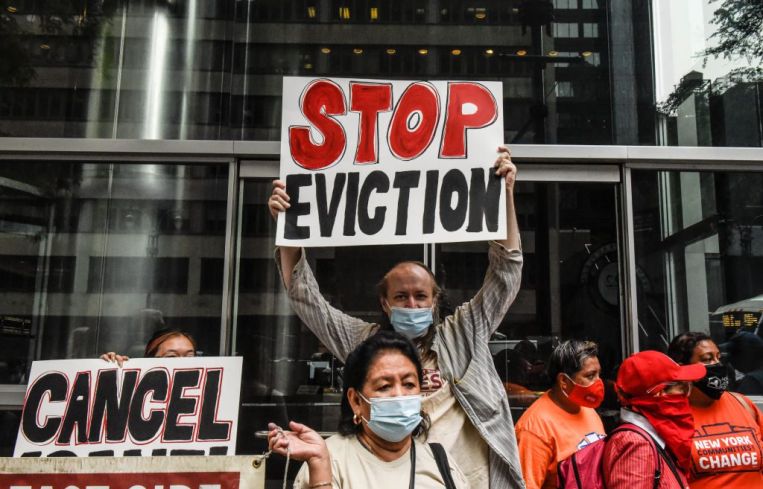US Supreme Court Nixes Eviction Moratorium, But NY and LA’s Remain
By Nicholas Rizzi August 27, 2021 2:55 pm
reprints
The United States Supreme Court nixed the federal eviction moratorium on Thursday night, ruling that the Centers for Disease Control and Prevention (CDC) did not have the authority to implement the measure.
The ruling, though, has little impact on similar moratoriums started by local governments in places like Los Angeles and New York state, experts said.
“Yesterday’s court ruling did not invalidate the concept of a moratorium, but focused on whether the CDC, which is an executive agency, has the power to impose a moratorium,” said Mark Axinn, chair of New York City law firm Phillips Nizer’s cooperative and condominium practice. “That doesn’t mean a legislative body, like Congress, doesn’t have that power.”
The Supreme Court’s ruling won’t impact states’ ability to impose or extend eviction bans, and landlords won’t likely be able to use the end of the federal moratorium to start proceedings against tenants in states without them, because the ruling was narrowly focused on the CDC’s authority, said John Pollock, a lawyer with the Public Justice Center and the coordinator of the National Coalition for a Civil Right to Counsel.
“Any state or local laws in place are actually getting honored,” Pollock said.
A bigger loss for the state’s ability to institute eviction bans came earlier this month, when SCOTUS partially lifted New York’s ban on tenant evictions, Pollock said.
The court did that because the Rent Stabilization Association, a landlord group, argued the state was denying them its right to due process by not requiring renters to prove they were in financial distress, and landlords were not allowed to show certain tenants could actually afford to pay their dues.
“That does create more of a problem,” Pollock said. “But there are ways that you can have a moratorium around the way New York’s did and not have the same issues.”
Pollock added that landlord groups around the country have constantly sued to overturn bans on evictions and have largely been losing in court. Still, the moratoriums are not completely out of the woods.
Many of them are expiring soon, with New York’s set to expire on Aug. 31, despite a push from some lawmakers to extend it again. And, while the U.S. Supreme Court ending the federal ban legally shouldn’t impact city and state governments’ ability to keep moratoriums in place, it could signal to them to let the cases resume, Axinn said.
“I believe it may send a message to various state legislatures that it’s time to open the courts back up,” Axinn said. “I also believe that the general feeling in New York is that it’s time to open the courts back up and try to resolve the huge backlog of cases.”
Hundreds of thousands of cases are expected to flood through courts around the country as soon as the federal ban ends.
“The data has shown that the CDC moratorium is holding back the flood of filings,” Pollock said. “When you combined the fact that the data shows the moratorium is really having an effect and we’re really a long ways away on rental assistance, it suggests we’re going to have a really bad scene starting now.”
Many states around the country have doled out federal relief funds to both tenants and landlords at a glacial pace. In New York, former Gov. Andrew Cuomo’s administration only doled out about 5 percent of the $2.7 billion aid available, something newly inaugurated Gov. Kathy Hochul hopes to change.
Nonprofit Robin Hood called on Hochul Friday to either release the spigot quickly on federal aid or “extend and improve” the moratorium in place.
If they don’t, New York’s courts were already overwhelmed with eviction cases pre-pandemic, which Axinn expected to get much worse once the moratorium ends.
“There were always far more cases filed than the court could possibly determine on the merits,” Axinn said.
That led many landlords and tenants to instead come up with settlements before going through a trial, which can give them a reduction on their arrears and set a timetable for them to get out of their apartment. That trend is expected to intensify.
“There’s going to be even more pressure on landlords and tenants to try to enter into an agreement than there was before a moratorium,” Axinn added.
While he said that can work in favor of both landlords and tenants, since it sets an “agreed resolution” for each party, Pollock argued that most housing courts around the country are extremely weighted toward landlords.
“If you go and watch how they operate, they’re set up to basically act as a debt collection tool for the landlords,” Pollock said.
To help the expected onslaught of evictions, Pollock suggested that states implement requirements for tenants to have a lawyer in these cases (oftentimes, they don’t) and mandate that landlords file for federal rental assistance aid before going to court.
“It takes time, they needed to be doing this yesterday,” Pollock said. “Every day is critical that they don’t wait on doing this.”
Nicholas Rizzi can be reached at nrizzi@commercialobserver.com.



